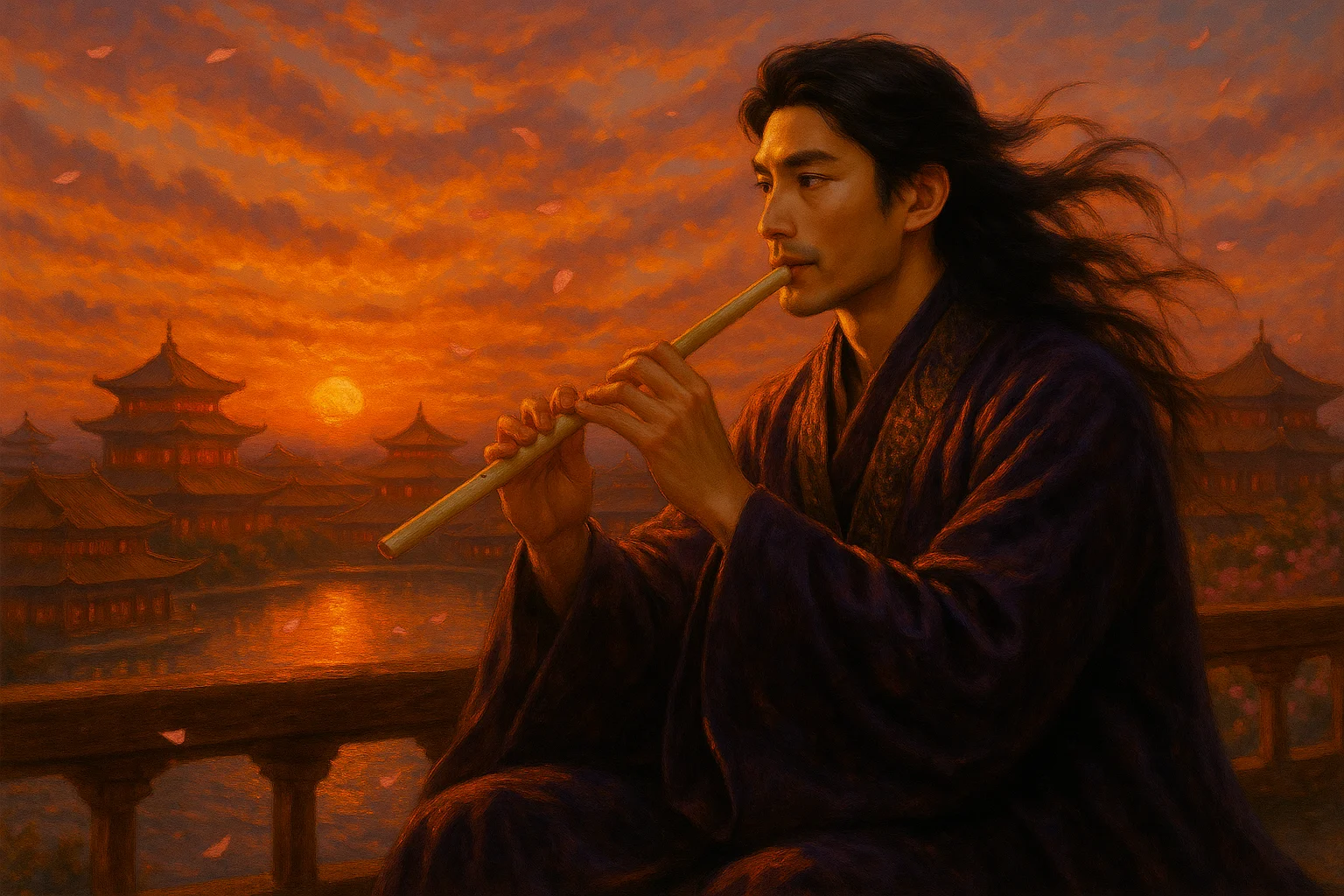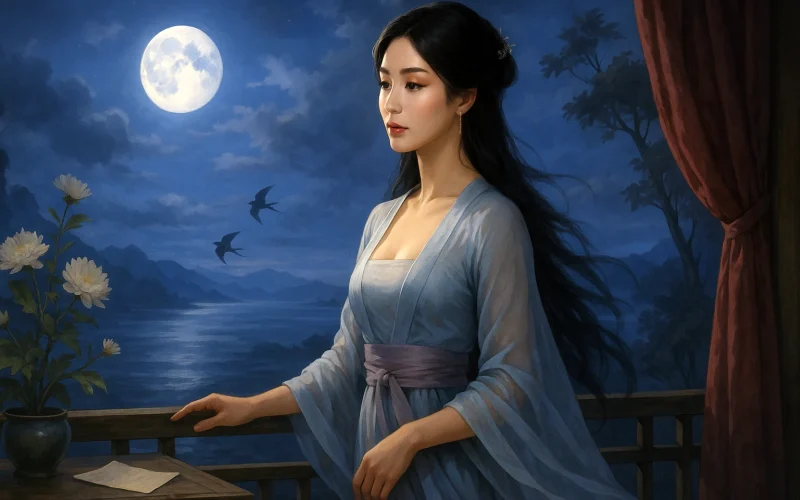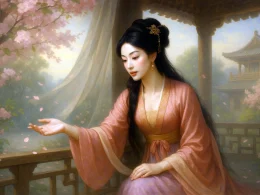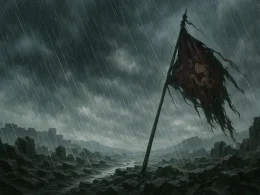Chrysanthemums fret in mist and orchids weep with dew;
Silk curtains feel the chill of autumn, I rue.
A pair of swallows fly away.
The moon, knowing not parting grief, still shines bright
And slanting through red windows all the night.
Last night the western breeze blew down green trees.
Alone I mount the tower high
And gaze my fill on the endless sky.
I’d send a message to my dear,
But where’s he now, so far and near?
Original Poem
「蝶恋花 · 槛菊愁烟兰泣露」
晏殊
槛菊愁烟兰泣露,罗幕轻寒,燕子双飞去。
明月不谙离恨苦,斜光到晓穿朱户。
昨夜西风凋碧树,独上高楼,望尽天涯路。
欲寄彩笺兼尺素,山长水阔知何处?
Interpretation
This lyric was composed during the Northern Song Dynasty, though its exact date of creation remains unknown. As a leading figure of the Wanyue (Graceful and Restrained) School, Yan Shu often infused his poetry with delicate emotions and philosophical contemplation. This work stands as one of his masterpieces and a classic example of the Wanyue genre's melancholic expressions of separation and longing. Originally titled "Que Ta Zhi" (Magpie on the Branch), its current name "Die Lian Hua" (Butterflies in Love with Flowers) was adopted by Yan Shu during the Song Dynasty, as recorded in Wan Shu's Qing Dynasty work "Cipu" (Manual of Song Lyrics).
First Stanza: "槛菊愁烟兰泣露,罗幕轻寒,燕子双飞去。明月不谙离恨苦,斜光到晓穿朱户。"
Jiàn jú chóu yān lán qì lù, luó mù qīng hán, yàn zi shuāng fēi qù. Míng yuè bù ān lí hèn kǔ, xié guāng dào xiǎo chuān zhū hù.
Chrysanthemums by the railings droop in mist like sorrow, / Orchids weep with dew. Through silken drapes, a chill breeze blows, / As paired swallows fly away. / The moon, knowing naught of parting's grief, / Still casts its slanting beams all night through crimson windows.
The opening lines personify nature through "sorrowful mist" and "weeping dew," projecting human melancholy onto the scenery. The paired swallows' departure accentuates the protagonist's solitude, while the moonlight piercing the windows all night reveals her sleepless torment. The emotion progresses from subtle suggestion to palpable yearning, rendered with exquisite restraint.
Second Stanza: "昨夜西风凋碧树,独上高楼,望尽天涯路。欲寄彩笺兼尺素,山长水阔知何处?"
Zuó yè xī fēng diāo bì shù, dú shàng gāo lóu, wàng jìn tiān yá lù. Yù jì cǎi jiān jiān chǐ sù, shān cháng shuǐ kuò zhī hé chù?
Last night's west wind stripped the trees of jade-green leaves; / Alone I climb the tower high, / Gazing to the horizon's edge. / I long to send my painted scroll and letters white— / But through these endless mountains, these boundless waters, where to find you?
"The west wind stripping trees" serves as both natural phenomenon and emotional catalyst, intensifying the protagonist's longing. Her solitary ascent to the tower embodies hope amidst despair. The closing lines—"these endless mountains, these boundless waters"—epitomize the melancholy of incommunicable yearning, achieving a sorrow too deep for tears, profound yet gracefully restrained.
Holistic Appreciation
The poem is meticulously structured, with the first stanza depicting scenes and emotions within a courtyard—orchids, chrysanthemums, a light chill, swallows, and the bright moon—all classic images that delicately unfold the heroine's sorrow of parting. The imagery is gentle and tender, the mood lingering and heartfelt. The second stanza shifts to gazing into the distance from a high tower, turning emotions outward, from stillness to motion, expanding the confined courtyard space to the vast horizon. The feelings evolve from delicate melancholy to expansive lament, creating a powerful emotional crescendo. The poem concludes naturally with "mountains stretch and rivers widen—who knows where?" leaving a lingering, resonant aftertaste.
Artistic Merits
This poem exemplifies the graceful restraint of the Wanyue (婉约) style, with its refined, understated language and deep, lingering emotion. The poet masterfully employs empathetic projection, infusing natural scenes with human sentiment, as in "chrysanthemums by the railings shrouded in sorrowful mist" and "orchids weeping with dew"—vivid metaphors that breathe life into the imagery. The two stanzas contrast in tone: the first is tender and delicate, the second broad and solemn, yet they complement each other emotionally, building layer upon layer. The lines "Last night the west wind withered emerald trees; / Alone I climb the high tower, / To gaze at the road’s end beyond the sky" were praised by Wang Guowei as embodying the first of "life’s three realms"—a profound and thought-provoking vision.
Insights
The poem conveys the melancholy of autumn separation and the wistfulness of lost communication, yet its tender emotions never lapse into weakness or complaint. Instead, it reveals a resilient, introspective spirit within its vast solitude. The emotional journey—from quiet sorrow to transcendent acceptance—offers readers a path of aesthetic and emotional elevation. It reminds us that even in moments of disappointment or parting, we can find inner transcendence and spiritual expansiveness by looking beyond the horizon from a higher vantage point.
Poem Translator
Xu Yuanchong (许渊冲)
About the Poet

Yan Shu (晏殊 991 – 1055) Originaire de Fuzhou dans le Jiangxi, Yan Shu fut le maître fondateur de l'école wanyue (élégante et retenue) de la poésie ci sous les Song du Nord. Enfant prodige entré dans l'administration à quatorze ans, ses ci allient noblesse classique et méditation philosophique dissimulée sous des évocations de prospérité raffinée. Mentor de talents comme Fan Zhongyan et Ouyang Xiu, il initia l'École du Jiangxi en poésie ci et posa les bases de l'épuration du genre sous les Song.












